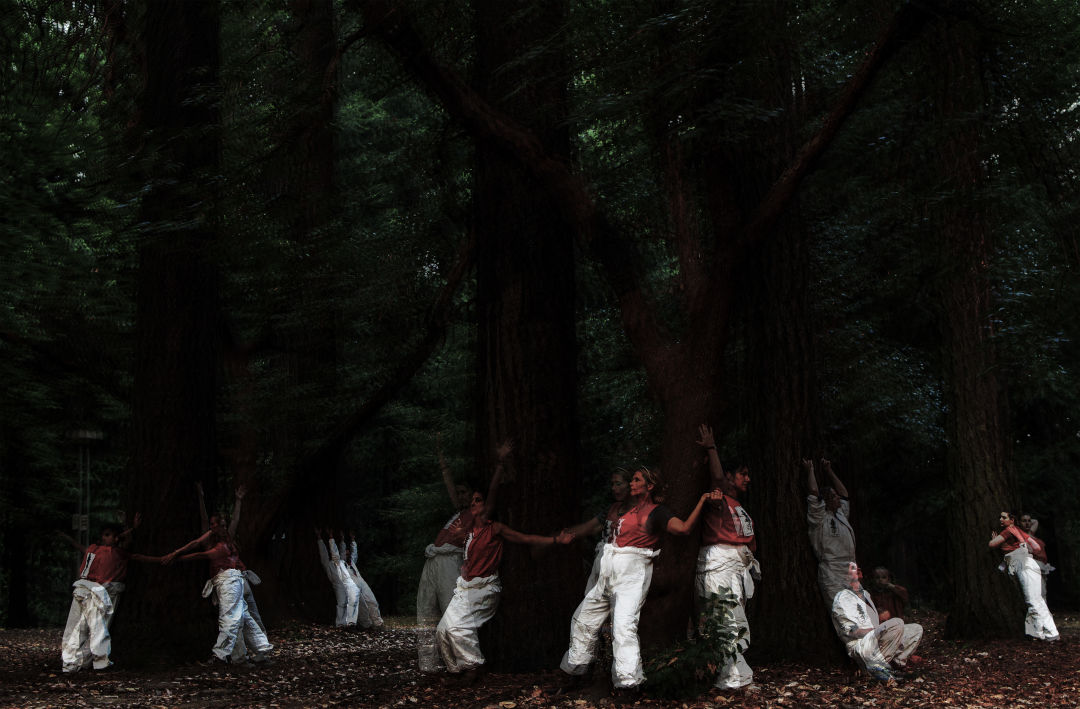A New Portland Show Searches for Utopia Onstage

Image: Joohee Yoon
In the 1980s, thousands descended upon a dusty patch of Central Oregon to build an alternative society. They were followers of the Bhagwan Shree Rajneesh, an Indian guru who preached a cocktail of sexual liberation, impending nuclear catastrophe, and vigorous meditation. He owned 93 Rolls-Royces. His disciples, called Rajneeshees, wore long orange robes and operated restaurants, a disco, a public transit system, even an airline. Within five years, the whole thing imploded amid attempted murder, immigration fraud, and mass contamination of salad bars. (Salad bars.)
It’s one of those truth-is-stranger-than-fiction situations. And made for the stage, right?
Maybe not. “It’s so weird, but it’s also a minefield,” says Andrea Stolowitz, a Portland playwright and two-time Oregon Book Award winner. Not wanting to focus on the sordid or soap opera details of a single community, Stolowitz and Hand2Mouth, a local theater company known for inventive, vividly staged work, used the Rajneesh episode as a mere jumping-off point to create Psychic Utopia, a performance exploring intentional communities and the lengths to which people will go for a fuller, freer life.
“We’re going to present it to people not as a historical piece, but as a 2017 mind experiment,” says Jonathan Walters, founder and artistic director of Hand2Mouth.
Happenstance set Psychic Utopia on its course. While living in Berlin a couple of years ago, Stolowitz traveled to Paris to visit a friend, a guy who’d always attributed his screwed-up-ness to his mother’s abandonment of the family to join a cult. “I never heard more about it,” Stolowitz says—till that visit. The playwright’s friend played an audio recording of an interview with his mother: how she’d felt called to leave her children—she signed over custody to her ex-husband—and move to a place she’d never seen. She had stumbled upon a book by Rajneesh while stoned, and joined the guru in Oregon. Side note: she is now a psychoanalyst in Paris; her son is writing a novel about their experiences; they’re close.

“We’re going to present it to people not as a historical piece, but as a 2017 mind experiment,” says Hand2Mouth's Jonathan Walters of Psychic Utopia.
For Stolowitz and Walters, who’ve collaborated on several shows—including 2015’s Time, A Fair Hustler, a gender-bending homage to Gus Van Sant’s My Own Private Idaho—that interview crystallized their theme. “We became less interested in the politics of the Rajneesh,” Stolowitz says. “It was an understanding of a very specific story of someone who is searching for something—in her life, in her divorce, in these therapies. What makes me happy? What kind of place do I want to live?”
Stolowitz and Walters, along with Hand2Mouth performers, embarked on roughly 30 interviews with others who’d joined off-the-grid communities in the West, generally during the ’70s and ’80s crest of the human potential movement. (See also: Esalen, rebirthing, Mad Men.) These interviews form most of Psychic Utopia’s script. Very little has been invented, though the company spliced and amalgamated people’s words to craft a handful of distinct characters.
“These people are all remarkable,” says Hand2Mouth company member Erin Leddy. “They all took this giant leap and left society as we know it. They spent so much time trying to open themselves up, and you can feel that when you talk to them.”
In Portland theater, Hand2Mouth is distinct. Rather than a traditional season of plays, the company creates original work as an ensemble, taking months—in this case, a year and a half—to hone a production.
As with previous productions—in which performers cheekily flirted with audience members or invited them onstage for foosball matches—Psychic Utopia will make attendees part of the action. Audience members will receive a towel to clean their hands, and then a performer will help them remove their shoes. (Choose socks wisely.) Houseplants will fill the studio space—the company issued a social media call seeking as many as possible. At times, performers will ask audience members to contribute stories of their own. (It’s opt-in, Walters assures.)
“It should feel a little like a spa,” adds Stolowitz. “We’re not inviting people to come in and punch each other.”
At one point, as the show builds, performers even forgo text—Walters promises “visual and sonic overload.” The goal is to create an immersive sense of ritual without devolving into alienating woo-woo. It’s a delicate line to walk, but Walters and Stolowitz say the era fueling their script offers more parallels with today than we might realize.
“We went and found the last generation of people who moved out to the Northwest to get free, and very extremely so,” Walters says. “Today, we [in Portland] are on the map as the place to do that. It’s like, ‘I’m gonna give up my car, get out of LA, and get on my bike!’ Today’s version doesn’t involve as much sacrifice, but it’s an unbroken line. It’s happening now.”



